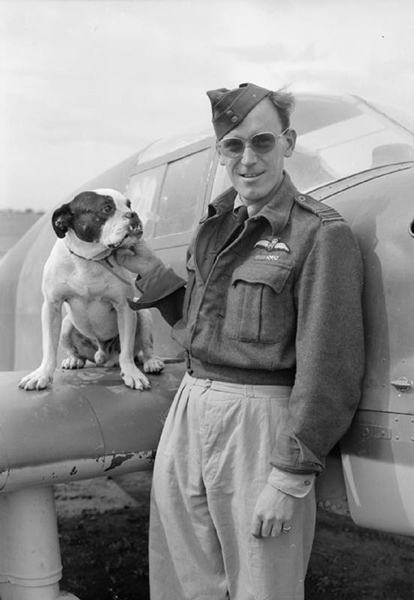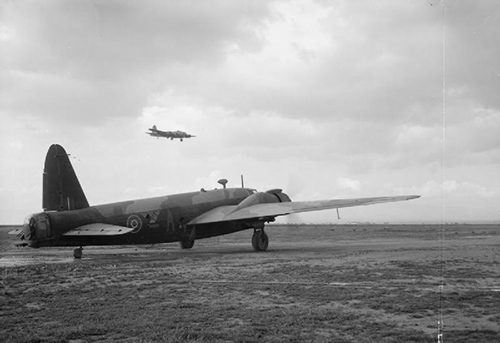Duncan-Smith, Wilfrid George Gerald
- Date of birth:
- May 28th, 1914 (Madras/Tamil Nadu, India)
- Date of death:
- December 1st, 1996
- Service number:
- 85684
- Nationality:
- British
Biography
Wilfred Duncan Smith was send to England at the age of 8 to go to school. He rejoined his family in India in 1933 and became at first a coffee and a tea planter. But in 1936 he returned to the UK and joined the RAF. Following receiving his wings he was posted at No. 611 Squadron which was a Fighter Command unit.
In August 1941 he became a flight commander with 603 Squadron but in November he contracted pneumonia and was admitted in hospital for the rest of the year.
Recovered he became CO of No. 64 Squadron. On August 19th 1942, Duncan-Smith was shot down over Dieppe landing and had to be rescued from the channel.
In August 1942 he was promoted, leading the Norwegian Wing from North Weald.
Duncan-Smith spent much of the winter as an instructor at Fighter Command’s School of Tactics.
In late Spring 1943 he was then sent to the Mediterranean as Wing leader, 244 Wing. In September 1943 after engine failure he bailed out into the sea, being rescued after 5 hours adrift by a Walrus amphibian whilst thw Walrus was strafed. He then took charge of 324 Wing, finally leaving in March 1945 covering the advance through Italy and the liberation of Southern France. He was cedited with 17 victories, 2 probables, 6 shared and 8 damaged.
After the Second World War, Duncan-Smith took a permanent commission in the RAF and served in a variety of posts in the Far East. In 1950, during the Malayan emergency, he supposed to have been the last RAF pilot to fly an operational sortie in a Spitfire. Actually this was Flight Officer Frank Walters who flown the last Spitfire sortie on January 1st, 1951.
After a series of staff appointments Duncan-Smith retired from the RAF in 1960 to take up a post with Triplex safety glass with whom he was involved in the Concorde project. Duncan-Smith retired in 1973 and wrote his memoirs of flying during World War II "Spitfire into Battle" in 1981. He died on December 11th 1996. His son Iain Duncan-Smith went on to be leader of the Consevative Party.
Promotions:
29th September, 1940.: Pilot Officer (probation)
29th September, 1941: Flying Officer (war sub)
27th June, 1942: Flight Lieutenant (war sub)
30th November, 1942: Squadron Leader (war sub)
? : Wing Commander
? Group Captain
Do you have more information about this person? Inform us!
- Period:
- Second World War (1939-1945)
- Rank:
- Pilot Officer
- Unit:
- No. 611 (West Lancashire) Squadron, Royal Air Force
- Awarded on:
- July 22nd, 1941
"This officer has participated in many operational flights over enemy territory and has always displayed the utmost keenness to engage the enemy. During recent operations, Pilot Officer Smith has destroyed at least three hostile aircraft."
- Period:
- Second World War (1939-1945)
- Rank:
- Acting Flight Lieutenant
- Unit:
- No. 603 (City of Edinburgh), Royal Air Force
- Awarded on:
- December 26th, 1941
"During 1941, this officer has carried out 190 operational patrols, 98 of which have been over enemy territory. By his skill, coolness and strong sense of duty, Flight Lieutenant Smith has set a splendid example to all. He has always devoted himself unselfishly to the success of his squadron thereby contributing materially to its achievements. Flight Lieutenant Smith has destroyed at least 5 enemy aircraft."
Second DFC awarded as a bar for on the ribbon of the first DFC.
- Period:
- Second World War (1939-1945)
- Rank:
- Squadron Leader
- Unit:
- No. 64 Squadron, Royal Air Force
- Awarded on:
- September 11th, 1941
Since being awarded a Bar to the Distinguished Flying Cross, this officer has completed a great number of sorties. He is a brilliant pilot and a fine leader whose skill has proved a source of inspiration to all. Squadron Leader Smith has destroyed 10 and probably destroyed several other enemy aircraft."
- Period:
- Second World War (1939-1945)
- Rank:
- Acting Group Captain
- Awarded on:
- March 20th, 1945
"Group Capt. Smith has led a fighter wing in the invasion of Sicily and in operations over Southern Italy. The high measure of success achieved by the squadrons under his command has been largely attributable to the boldness and soundness of his leadership. Since he took over command of his wing, 85 enemy aircraft have been destroyed in combat and many others damaged.
Group Capt. Smith has taken an important part in the successes thus achieved. He has destroyed in all 14 enemy aircraft and a large number of transport vehicles and locomotives. As an operational commander, Group Capt Smith has rendered extremely valuable and devoted service."
Second DSO awarded as a bar for on the ribbon of the first DSO.
Sources
- - SHORES, CH. & WILLIAMS, C., Aces High, Grub Street, London, 1994.
- The London Gazette Issue 35225 published on the 22 July 1941
- Supplement to The London Gazette Issue 35392 published on the 23 December 1941
- Third Supplement to The London Gazette Issue 35699 published on the 8 September 1942
- Fourth Supplement to The London Gazette Issue 36991 published on the 16 March 1945
- The RAF Hornchurch Project
- Aviation News | Aviation Industry & Airline Statistics | flightglobal.com





